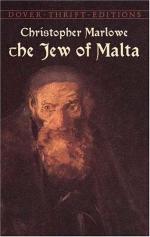|
This section contains 5,870 words (approx. 15 pages at 400 words per page) |

|
In the following essay, Humphreys contrasts The Jew of Malta with Shakespeare's The Merchant of Venice, focusing on the differing philosophies expressed in them.
Whenever The Jew of Malta and The Merchant of Venice are staged in close juxtaposition (as in the 1965 summer season at Stratford-upon-Avon, the role of the great Jew in both being superbly taken by Enc Porter), the audience is vividly provoked to reflect on two radically differing sorts of dramatic mind. The plays, it is true, have much in common. In both, riches and the power they confer are a theme to be explored. In both, the traffic of the world and the excitement of exotic places offer imaginative enlargement far beyond what is actually seen: this is an instance of that "emotion of multitude" which W. B. Yeats defined as "the rich, far-wandering, many-imaged life of the half-seen world [beyond] the little...
|
This section contains 5,870 words (approx. 15 pages at 400 words per page) |

|




